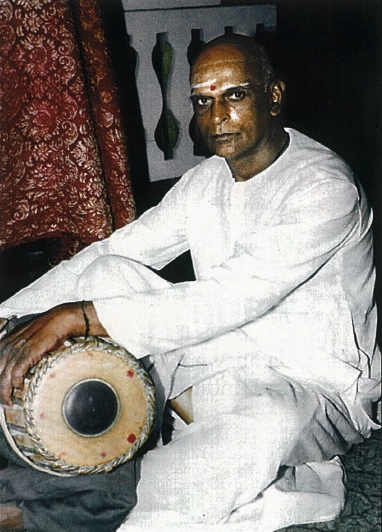By Kalyani Giri
From the deep recesses of my mind, I draw out my early memories of Sri Gopalan Govender. I was barely ten years old and living in South Africa. At the insistence of my father, a true aficionado of the cultural arts, I was compelled to join my younger brother and sister in the tabla classes conducted by a percussion maestro. Among other students in the conference room at the Vedic Hall on Carlisle Street in Durban, I sat in awe of this taciturn man whose hands steadfastly meted out excellent talam (rhythm), while he chanted the sollukattu (notation), pausing here and there to correct or encourage a student. I soon discovered that beyond the stern demeanor lurked an agile mind and a rapier sharp wit. Of my own volution, I soon stopped taking lessons, but my respect and admiration for this great South African, now 76 years of age, continues to this day. He started a music renaissance among the youth, instilling in us a sense of pride in our cultural heritage.
Hailing from humble beginnings, Sri Gopalan and his eight siblings were nurtured in a household rampant with love, discipline and strong principles. The 1900s were dark ages for the arts in South Africa, as apartheid wrought havoc on the morale of indentured Indian laborers. Still, Sri Gopalan’s late parents, Sri and Smt. K. Perumal Govender, began teaching Tamil language and devotional songs. His father, an accomplished violinist and dramatist, took to the stage, using his considerable talent to secure recognition of Tamil culture in South Africa.
At five years of age, Sri Gopalan would tap out rhythm indiscriminately on any solid surface he could find. His father, hoping to encourage his son’s flair for percussion, invested in a set of tablas for him. In 1931, Sri Gopalan had what he deemed a spiritual experience while listening to a recording of Carnatic music. “My father purchased a record made in India by the renowned vocalist, Sangeetha Kalanidhi Sri Chembai Vaidyanatha Bhagavathar,” Sri Gopalan told me reflectively. “On this record was Tyagaraja’s composition ‘Raghuvara,’ in raga Panthuvarali. The mridangam accompaniment was by the incomparable Sri Palaghat Mani Iyer. The sound of that drum stole my heart and gave me inspiration to someday learn to play that majestic instrument.”
By 1934 Sri Gopalan was well on his way to being recognized among the best musicians in South Africa, who included Edward Govindsamy, S. P. Reddy, S. A. Reddy and J. R. Devar, each of whom he accompanied on occasion. He was a founding member of the New India Orchestra in 1940 and soon joined the Ranjeni Orchestra, remaining with them until 1951.
Gopalan craved a more structured learning and more theoretical and practical knowledge of the mysteries of South Indian classical music beyond what South Africa had to offer. With the help of benefactors, Sri Gopalan’s dream of going to India was realized in 1953.He moved to Madras, now Chennai, the cultural capital of South India, and for nearly four years received mridangam training from the great Sri Ranganathan, while taking private classes in tabla and dholak from Shri M.V. Murthi. He reveled in the ambiance of Madras and the thrill of sitting in Madras Music Academy listening to the great stalwarts he had idolized for so long.
He returned to South Africa a hero and, now based in Durban, was much sought after by local and visiting musicians. His consistent expertise in his field has brought him numerous awards, including the Indian Academy of South Africa’s prestigious Nadaraja Award in 1985, the Natal Tamil Vedic Society’s Mahalakshmi Award and the Ponn Aadai or Golden Shawl. He is a trustee of the Natal Tamil Vedic Society and a lifelong honorary vice president of the Southern Hemisphere’s largest temple, the Sri Vaidyanatha Easwarar Alayam.
Aside from being a great performer, Sri Gopalan is an extraordinary teacher who indefatigably grooms a number of young students into admirable artists. He gives unreservedly of his knowledge, a rare phenomenon in artistic circles where rivalry often supercedes dignity. Many of South Africa’s finest have come under his tutelage.
Every day of the week, Sri Gopalan teaches tabla, mridangam and devotional singing. His students constitute his large and extended family, and no one is more proud of them than he. He embraces the philosophy of high thinking and simple living. In all his years of teaching, he has never taken money for his services. His views on this subject are definite. “It is my duty to impart my knowledge and skills to those willing to accept it,” he says. “My satisfaction comes from the spiritual value. It is important to keep one’s culture alive–there is no price on that.”
Sri Gopalan Govender: 26 Tipstone Place, Unit 11, Phoenix, 4068, Durban, Natal, South Africa
